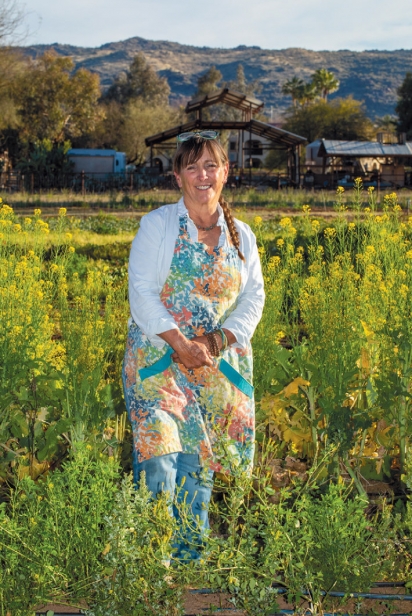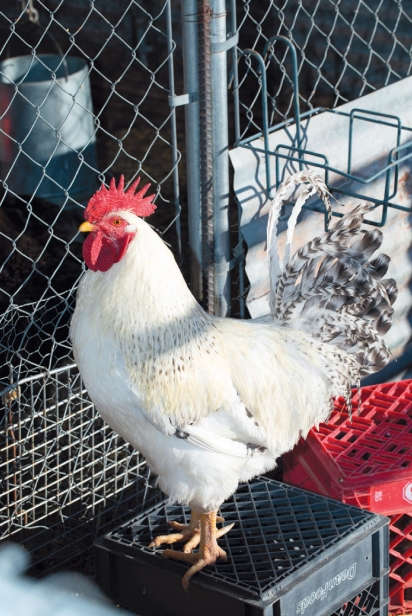Saving Maya’s Farm
A Coalition of Local Groups Works to Preserve Urban Farmland
The shadows are lengthening as photographer Brian Goddard and I pull into the driveway at Maya’s Farm. As we wait for farmer Maya Dailey, the goats and chickens in the pens next to the driveway bleat and cluck at their visitors. But then, when Maya’s car pulls into the driveway, the ruckus really starts.
“Maaayyyyaa,” the goats yell. “Mayamayamaya.”
She gets out of her car and laughs. “They know it’s me and it’s dinnertime.”
Dailey, a well-known and beloved presence in the Phoenix food world, has been farming the 3+ acre parcel along 32nd Street north of Baseline in Phoenix for more than a decade, and what was once a piece of denuded vacant land has bloomed under her stewardship.
As we stroll among the fields planted with spring greens, other vegetables and flowers for Daley’s CSA customers, farmers market shoppers and local chefs, the bees are buzzing in the row of rosemary, a bunny skitters through a field and a hawk soars overhead. Daley says she’s seen a variety of wildlife, including coyotes and squirrels, on the property.
Much of the land around the farm is vacant, so it’s a verdant oasis for critters and people, too. As we talk, the hum of late-afternoon traffic on 32nd street has become almost imperceptible. Dailey says she particularly enjoys the end of the day on the farm. “When everybody leaves, the angle of the sun is perfect, and it gets this peaceful aroma and flavor,” she says. “It’s, like, ‘Wow this is nice.’ It’s the calming part of the day.”
Like many small producers, Dailey is farming leased ground, and in a place like Maricopa County, where developers gobble up land to build sprawling housing developments, strip malls and business parks, the loss of farmland is accelerating as the population is booming. The county lost 24% of its farms in the five years between 2012 and 2017. This, even as the pandemic has exposed the fragility inherent in industrial food supply chains, and populations are realizing the critical importance of producing food locally. In fact, a few years ago, Maya’s Farm itself was in danger of becoming a luxury home development until the deal failed to materialize.
That pressure on farmland makes it difficult for farmers to invest in infrastructure—Dailey’s farm has no electricity except for the small amount produced by generators—and all the rich organic soil that’s taken years to build can’t be moved if a farm must relocate. “Why would I want to invest in something that’s going to disappear, that I might have to pick up and leave in two weeks?” she asks.
But with funding from a unique program developed by the City of Phoenix in collaboration with the Central Arizona Land Trust (CALT), a nonprofit that works to preserve open space in six Arizona counties including Maricopa, Maya’s Farm will survive. The Phoenix City Council approved $1 million for the Farm Preservation Program, part of the Phoenix Resilient Food System Program, to preserve up to three farms in the city. The money was allocated from the COVID-19 state and local recovery fund, part of the American Rescue Plan Act of 2021.
Sharma Torrens, the conservation specialist for CALT, says Phoenix recognizes the benefits of urban farming. “The goal is to conserve farms within the City of Phoenix, so not only conserving our local food supply, but also all the other benefits that come with having a farm: the open space, the biodiversity, the jobs, the economic contribution, the soil and everything else.”
Conservation easements are nothing new. Ranchers all over the western U.S. use them to protect grazing lands from development, and municipalities usually employ them to create urban green spaces and parks. Basically, the landowner agrees to sell or donate the development rights on a piece of property—usually worth 40% to 80% of the appraised value—but still owns the land. The deed restricts the uses for the land and is usually administered by a land trust. Even if the land changes hands at some point in the future, the parcel can’t be developed. But using a conservation easement to protect urban farms is an unheard-of concept, at least in Arizona.
In the case of Maya’s Farm, the landowner, Bridget Bellavigna, has agreed to put a conservation easement on the property, which means the parcel will remain farmland in perpetuity, no matter who eventually owns it. Bellavigna, a realtor and investor, says she bought the property, at the time vacant land, in 2004 on a whim. “I drove by one day and there was a tiny, white ‘for sale’ sign, and I just hit my brakes,” she says. “On the spot I just wrote out something on a piece of paper. I thought it was an awesome investment opportunity. I didn’t even know what I was going to do with it.”
The land stayed empty for a few years until Dailey called Bellavigna and asked if she could rent it to move her small operation from the nearby Farm at South Mountain. They came to terms, and Maya’s Farm became a reality. In the intervening years, the two have seen tangible benefits from their relationship: for Dailey, a place to run her own business according to her own vision; and for Bellavigna, the rent and reduced property taxes that come from having vacant land rezoned to agriculture.
As Bellavigna started looking at her retirement options, she knew she would have to sell the land eventually. In fact, before the idea of a conservation easement came up, she was working with a potential buyer. “I was always totally open with Maya. Anytime I spoke to somebody about selling, I always had Maya’s interests first,” she says. “I would tell them ‘It’s being farmed, and it’s beneficial to you to continue to let Maya farm it.’ I would give them all the reasons why.”
She adds, “Maya’s taken phenomenal care of the land. Everything that’s on it is her doing. It was just a piece of vacant land, so everything you see that’s so beautified, organized—the pad, the irrigation, everything—it’s all Maya. So she’s really done an amazing job.”
While Dailey appreciated the transparency, it also caused her to live with added uncertainty. “I have been in limbo for four years,” she says. “So I’ve had one foot in and one foot out. The year COVID hit, I had decided by May I was done. I was quitting, I wasn’t gonna do this anymore. And then COVID jump-started the business again.”
The process of screening applications for the Farm Preservation Program began late last year, and once Maya’s Farm was selected, it took about five months to close on the easement. The intervening months were spent in negotiations between Bellavigna and CALT, along with a property appraisal, survey and phase one environmental assessment. The City of Phoenix contributed 75% of the value of the development rights, but then the remainder of the funds had to be raised by donations from the community. The effort was a partnership with several other local nonprofits including Local First Arizona, Pinnacle Prevention, the Coalition for Farmland Preservation and others, as well as community members.
The most obvious beneficiary of the conservation easement is Dailey. She now has the security to keep farming and improving the land. She recently received a grant to install solar, which will give her more flexibility and enable her to make the farm an educational center. “I sort of have a big vision about how we can teach stewardship of the land and environmental awareness, so that’ll come down the line,” she says.
For Bellavigna, she was able to get most of the cash out of the property and still own it, although in the grand scheme, she would like for Dailey to buy it, something that’s more realistic now that the cost of the land is lessened because the development rights are gone. That will probably involve another community fundraising effort. She also made sure that the deed included language to allow for a small building envelope in case Dailey ever wants to build a home or education center on the site. But the property will always be farmed, no matter who owns it.
The program also gave Bellavigna an opportunity to contribute to the well-being of her neighbors. “It makes me feel good that I’m doing something that’s beneficial for the community and the environment,” she says. “It all matters.”
But the real winners are the City of Phoenix and the community. A source of local food has been guaranteed, a small business has the security to expand and succeed, and an island of peace and quiet for both people and wildlife will endure for generations to come.
“We’re building all those glass buildings downtown, but we need to save some open space so the desert can breathe,” says Dailey.
Torrens of CALT says the process was a learning experience for everyone involved, but now they’re ready to move on to easements for the next two farms. Applications and details are available on the CALT website. She’s optimistic about the potential of the program.
“We’re hoping that the City of Phoenix might be able to continue this program into next year. I don’t know that for sure, but I’m hopeful that would be the case,” she says. “I think that the City of Phoenix has really been innovative and thoughtful in conserving our long-term resilient food system this way, by conserving our prime farms. I would like to see other cities follow suit.”
Dailey is grateful. “I’m very blessed and also honored by the kind of support and care that’s come from lots of players,” she says. “We had the right players with the right temperaments and the right amount of knowledge to make this work. It’s amazing, really.”
MARILYN NOBLE is the author of four Southwestern cookbooks and has written hundreds of articles on everything from aviation to agriculture and food. She also does communications work for nonprofits in the sustainable food and agriculture sectors. She was born in the desert Southwest and now lives in Tempe.
CONTACTS
For general information, see City of Phoenix, phoenix.gov/oepsite/Pages/Farmland-Preservation-Program.aspx
To donate to CALT, see centralazlandtrust.org
For applications or to see the partners in the program, go to centralazlandtrust.org/save-our-farms/save-our-farms or contact Sharma Torrens, conservation specialist: 602- 540-5331 or agconserveconsulting@gmail.com.
Maya’s Farm: mayasfarm.com; 480-236-7097








